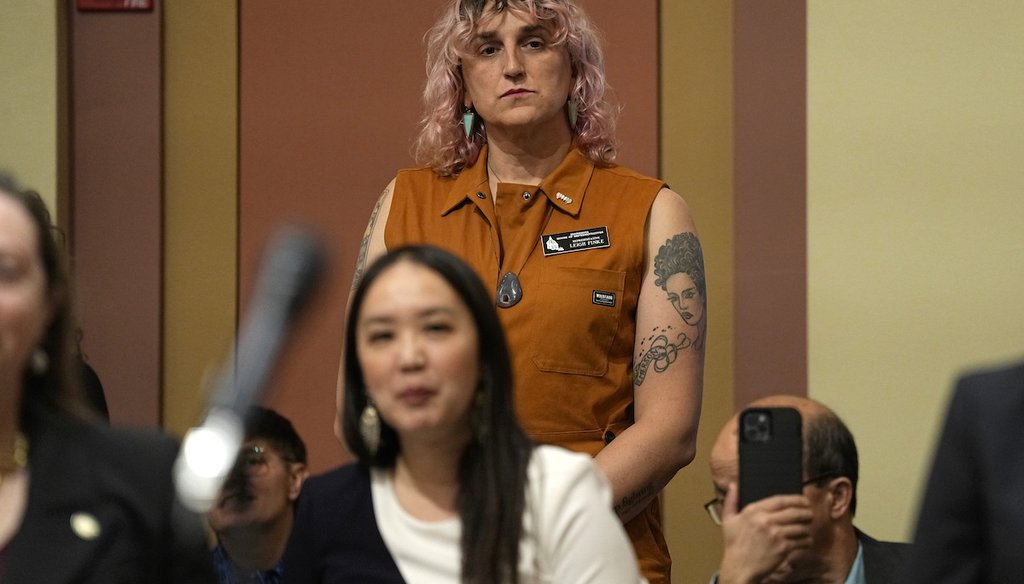

Our only agenda is to publish the truth so you can be an informed participant in democracy.
We need your help.


Rep. Leigh Finke, D-St. Paul, attends a legislative session Jan. 3, 2023, in St. Paul, Minnesota. (AP)
The bill updates the definition of "sexual orientation" in Minnesota’s Human Rights Act. But this does not create a protected class for pedophilia.
Legal experts said laws prohibiting discrimination because of sexual orientation do not extend to child sex offenders, regardless of whether they are explicitly singled out.
An amendment was added to specify that child sex offenders are not protected under the state’s Human Rights Act.
Did the Minnesota House pass a bill that would make it illegal to discriminate against child rapists?
Gays Against Groomers, an organization of gay people who oppose the "sexualization, indoctrination and medicalization of children under the guise of ‘LGBTQIA+,’" claimed a proposed change in the Minnesota Statutes is part of an effort to "legalize pedophilia."
"BREAKING: A transgender representative in Minnesota has introduced a bill that will remove the exclusion of pedophiles from the protected class of ‘sexual orientation,’" the group tweeted April 26. "This means it will be illegal to discriminate against child rapists."
Some reports from conservative news outlets also claimed that the bill would remove "anti-pedophile language."
These claims are misleading.
Rep. Leigh Finke, D-St. Paul, who is transgender, wrote House File 1655, also called the "Take Pride Act." The bill creates a new definition for "gender identity" in the Minnesota Human Rights Act and makes it a violation to discriminate against people based on their gender identities in housing and education, for example.
The bill also removes a line on the existing definition of "sexual orientation" that says: "‘Sexual orientation’ does not include a physical or sexual attachment to children by an adult."
Gays Against Groomers argue this change would make it harder to discriminate against child sex offenders.
But legal experts we interviewed agreed that laws prohibiting discrimination because of sexual orientation do not protect pedophiles, regardless of whether the laws have that specific disclaimer.
Arthur Leonard, a New York Law School law professor who frequently speaks on sexual orientation law, told PolitiFact, "I am unaware of actual cases in which courts have interpreted bans on discrimination because of sexual orientation to protect ‘pedophiles’ from discrimination or from prosecution under criminal laws."
David B. Cruz, Newton Professor of Constitutional Law at the University of Southern California Gould School of Law, said it is generally accepted in legal contexts that the term "sexual" in "sexual orientation" refers to the sex or gender/s of people to whom someone is attracted.
"Textually, then, the phrase ‘sexual orientation’ does not require a disclaimer to rule out non-gender-based aspects of attraction," he said. "With nothing more, this makes it inconceivable that the proposed change to Minnesota law would affect the scope of the protections it affords."
Minnesota statutes already specify that sexual orientation is about having attachments to another person regardless of that person’s sex, not that person’s age, said Brian Soucek, a law professor at the University of California, Davis School of Law. "No court in the country has or would ever say that a law protecting people from discrimination based on their sexual orientation extends to protecting pedophilia."
The Take Pride Act was folded into a larger bill of civil law policy changes. State Rep. Jamie Becker-Finn addressed the changes April 26 on the House floor, acknowledging that the provision on sexual orientation has "gone off the rails a bit on social media."
"Nothing in the bill changes or weakens any of the crimes against children in our criminal statute, or the state’s ability to prosecute those who break the law. Of course pedophilia is not a protected class, is not a sexual orientation, which is why the language never should have been in the bill in the first place," Becker-Finn said.
In Minnesota, penetration with a person younger than 18 or sexual contact with a person younger than 14 could lead to a charge of first-degree criminal sexual conduct. It is punishable by up to 30 years of imprisonment, a fine of up to $40,000, or both.
To further ensure that child sex offenders would not be protected under the state’s Human Rights Act, Rep. Harry Niska, R-Ramsey, proposed adding language to the civil law policy bill saying, "The physical or sexual attachment to children by an adult is not a protected class under this chapter." The amendment was added to the bill, which the House passed April 26; the measure awaits a Senate vote.
We rate this claim False.
RELATED: Why it’s not ‘grooming’: What research says about gender and sexuality in schools
Tweet, April 26, 2023
The National Desk, Minnesota Dems strike language excluding pedophilia as protected category under discrimination laws, April 26, 2023
Fox News, Transgender Minnesota lawmaker introduces bill removing anti-pedophile language from state's Human Rights Act, April 26, 2023
House File 1655, accessed April 28, 2023
Minnesota House Research, H.F. 1655 Bill Summary, March 8, 2023
2022 Minnesota Statutes, accessed April 28, 2023
MN House panel approves HF1655 3/8/23, March 8, 2023
House Floor Session – part 3 4/26/23, April 27, 2023
Minnesota House Research, H.F. 447 Bill Summary, March 28, 2023
Minnesota House, Journal of the House, April 26, 2023
Email interview, Arthur Leonard, professor of law at the New York Law School, May 2, 2023
Email interview, David Cruz, Newton Professor of Constitutional Law at the University of Southern California Gould School of Law, May 2, 2023
Email interview, Brian Soucek, professor of law at University of California Davis School of Law, May 2, 2023
In a world of wild talk and fake news, help us stand up for the facts.
